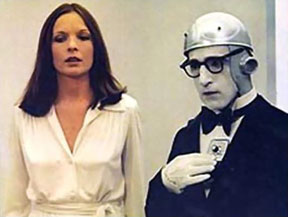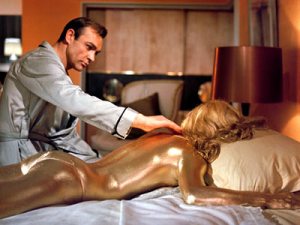
- TONIGHT: Woody Allen double at the Astor: 1973’s Sleeper (about a man who is frozen after an ulcer operation and wakes up in the future 200 years later) screens with Everything You Always Wanted to Know About Sex from 1972. [Astor]

- WEDNESDAY 1st: Cinematheque opens its retrospective of the work of Polish director Jerzy Skolimowski. This weeks double is Four Nights With Anna (2008), a stylised film on obsessive love and Deep End (1971) a black comedy about an adolescent boy’s sexual awakening as an employee of a seedy London bathhouse. [Cinematheque]

- THURSDAY 2nd: This could be interesting. ACMI is playing a documentary called Beautiful Losers about a group of multi-disciplinary artists including street artist Shepard Fairey and filmmakers Harmony Korine (Kids, Ken Park, Mister Lonely) and Mike Mills (Thumbsucker). Hilarious interview with Harmony Korine from 1995 on Letterman which is pretty much required viewing here. Beautiful Losers is screening until Sunday. [ACMI]
…

- FRIDAY 3rd: ACMI shows as part of their ‘Focus on Girls 24/7’ program Agnes Varda‘s Cleo from 5 to 7, a French New Wave film about a ditzy singer who kills time on the streets of Paris. [Focus on Girls 24/7] Freaky Fridays screens Executive Koala about a Japanese salaryman who also happens to be a koala. [Freaky Fridays] Cinema Fiasco presents Black Mama, White Mama a 1973 exploitation flick starring Pam Grier and Margaret Markov about two ladies flung into a Third World women’s prison featuring the requisite shower scenes, cat fights and lesbians. The presentation features live commentary which sounds pretty irritating and unnecessary. [Astor]

- SUNDAY 5th: James Bond double-feature at the Astor: Goldfinger (1964) and Thunderball (1965). [Astor]

Deep End is fantastic. But don’t forget the one-off screening of Jeanne Dielman! I predict walk-outs galore.
Deep End was really unpopular with the cinema studies kids. Consensus was that it was misogynist and had a cheap ending. I would add that it’s not quite as good as 40 Year Old Virgin.
Thoughts?
I actually really enjoyed it up til the end. I thought it was hilarious. How did you like it?
I don’t see where the charge of misogyny comes from. There are male as well as female caricatures, and the Jane Asher character is anything but a stock femme fatale.
For an analogue in modern US cinema I’d go to Rushmore rather than 40-Year-Old Virgin. But Skolimowski frames bodies far more inventively than either.
Well Deep End subscribes to the protagonist’s view of women as virgins or sluts. Susan’s liberal sexuality is viewed as perverse in contrast to Mike who is sexually curious but who is morally committed to the idea of the heterosexual, monogamous couple. (Also note the homophobia of both Deep End and 4 Nights with Anna). Susan is not just liberal in her sexuality: She is denigrated to the point of which she is imagined as a stripper/prostitute and at the end of the film she is punished for her sexual subversion through death. (She is such a cold bitch that she won’t stay and comfort Mike when he’s naked and vulnerable. She is cold and impenetrable like the best of the spiderwomen.)
It was sporadically funny. I don’t quite understand what all the fuss is about. It was surprisingly sexually conservative despite the anarchic tone and the Cat Stevens music was lame. Both the leads were attractive though. I suspect I’d enjoy a p o r n parody of Deep End.
That’s a harsh verdict on Susan, who can hardly be blamed for wishing to flee a very awkward situation. The ending is absurdly ironic, not a case of deserved punishment. I see no evidence that Skolimowski judges any of his characters, but on the whole Susan seems less “perverse” than Mike – who quickly becomes fixated on a fantasy image, as the scenes with the stolen placard spell out.
But he confronts Susan on the Tube using the placard as evidence that she’s a dirty whore.
I would argue that the critical difference is between Mike’s male fixation which is cute and endearing because he’s so young and innocent and Susan’s sexual transgressions which incite feelings of jealousy, betrayal and abandonment. As the audience identifies with Mike (the film is primarily from his male perspective), they are also led to identify with his judgment of Susan.
Brad, I think that’s a matter of interpretation. I didn’t see him as cute and endearing. His fixation becomes quite painful and grating, to the extent that it seems Skolimowski could be unsympathetic to his character. Misandry? I don’t think so.
Susan wasn’t depicted as a ‘dirty whore’. The story might have been told from Mike’s perspective, and that might be how he saw her. But I that’s not how I saw her and I never sensed that Skolimowski did either, which is underscored by Mike’s immaturity. That is, seeing her as a ‘dirty whore’ is a simplistic attitude by those who are immature. Food for thought, maybe?
I see both characters as endearing but morally neutral. Mike is a crazy mixed-up kid: we might sympathise but we can hardly share his point of view, particularly at the end. Sue is almost equally vulnerable, and clearly has a rough time with men – look at the way her horrible fiance bullies her into the porn theatre.
These are my interpretations: part of the cunning of the mosaic construction is that it omits a lot of crucial material – Mike’s homelife, Susan’s past – giving us ample room to speculate. But it’s not all black and white!
I can’t see how any claim of misogyny can be sustained. I don’t have any special insights to the film, but my perspective is that it is an exploration of emerging attitudes of the day. The film is very 70s with its depictions of nudity and themes of rebelling against social mores.
I didn’t see the girl as a ‘slut’ at all and – like Jake – nor did I think Skolimowski was projecting her as such. I agree that the boy was just as “perverse” with his fixations.
Interesting take. What social mores do you think were being rebelled against in the film?
I suppose films are often an ‘exploration of emerging attitudes of the day’ but it doesn’t always mean they are progressive films. The film noir of the fifties were certainly a product of social changes and were for the time sexually transgressive. But they were also plagued by a misogyny which is fairly well-accepted in academia these days.
Misogyny is a term that is way over-used, and way mis-interpreted. No doubt you’re aware that it literally means hatred of women. Misogyny is no more common than misandry (hatred of men), a word that is absent from all but the largest of dictionaries. Social mores and attitudes change, and it’s easy to judge values of one era from the comfort of another. If we were to hold the same values now, with what we know now, it may arguably be misogynistic, but that doesn’t make it so then.
As for your question, the mores are about the ‘sexual liberation’ of women. This film’s depictions would have been contentious in its day. In this respect, it probably is similar to La maman et la putain (The Mother and the Whore).
Misogyny literally means “hatred of women” but its actual meaning is broader. I often get annoyed at bigots who claim they are not homophobic because they aren’t “scared of the gays”. Misogyny is commonly used to refer to contempt or fear of women.
I also don’t think misogyny and misandry are equivalent. ‘Misogyny’ as a term is a strategy by the disempowered to make apparent the patriarchal structures of society. That ‘misogyny’ is a common term and misandry is not speaks to the continuance of patriarchal structures to this day. Whoever heard of “men”, as a collective, being disenfranchised?
Instances of so-called misandry (where women are favoured over men) must be looked at in the context of the history of their disempowerment – much like the charges of reverse-racism lobbed at affirmative action programs.
I know it sucks to be born into a group of oppressors (male/white/heterosexual) with the attendant labelling, but it’s much worse to be the oppressed.
I agree that the meaning is broader and yes, contempt is a fair call, but fear? I wouldn’t have thought so. Homophobes may claim not to be scared of gays, but that’s just false bravado. Actually, they’re scared shitless.
Why do you think misogyny and misandry not equivalent. One is visible – and I think more than is factually so – and one is virtually invisible. Women as victims is a myth and male power is a myth. Each wields a different type of power. Words like misogyny and patriarchy are emotive terms used with political content (not party politics, but with hidden or implied meanings). Just like the word ‘terrorist’ has a different meaning post 9-11.
Society may be called patriarchical, because men tend to be the leaders of society’s institutions, but that’s just a concept. Society may also be called matriarchical because women wield the vast majority of other kinds of power (raising of children, management of the household, etc). I’m not talking about entrenching people of any gender in any role, but I think it’s often disengenuous of people with a political motive to be claiming the role of victim or underdog, disregarding the facts. I’m not suggesting in any way that that’s what you’re doing, but I believe that there are many common misconceptions on this subject that have come to be accepted as fact, but aren’t.
This is a very complex subject, and I doubt we’ll come to any resolution here.